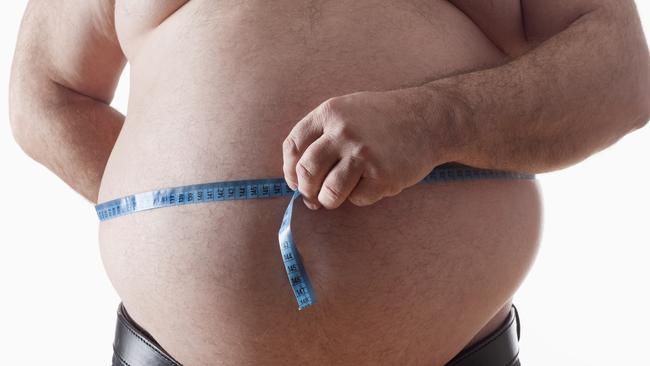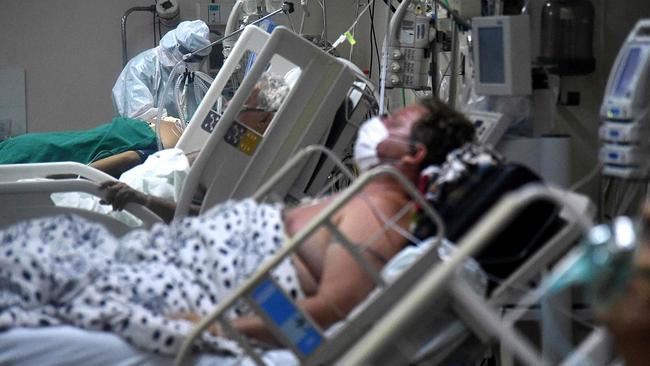Queensland’s rising obesity rate is a massive COVID-19 death risk
With obesity confirmed as a major driver of COVID-19 deaths overseas, Queenslanders should be alarmed, writes data expert Dan Petrie.
QLD News
Don't miss out on the headlines from QLD News. Followed categories will be added to My News.
Have you heard the one about the guy who thought he had COVID because he couldn’t breathe?
Then he unbuttoned his pants and he was all good.
COVID kilos and Quarantine-15 (in reference to pounds gained in lockdown) are easy to joke about when we’re stuck at home binge eating on the couch.
But it is also the bulging elephant (pardon the pun) in the room when it comes to COVID-19’s death rate.

Being obese can include an increased risk of clots in the lungs, diaphragms constricted from belly fat making breathing difficult and a compromised immunity from fatty organs.
Of the 2.5 million coronavirus deaths worldwide, 2.2 million were in countries with high levels of overweight people, according to a report released last month by the World Obesity Federation.
It doesn’t matter about age, wealth or state of the health system – there was a “dramatic” increase in death rates in countries where more than half the population was overweight, the study shows.


Countries such as Belgium, Slovenia, the UK, US and Italy, where more than 50 per cent of adults are overweight, have the highest number of COVID deaths.
Meanwhile, Vietnam, with one of the world’s smallest populations of overweight people, also had the second lowest COVID death rate.
With Australia relentlessly marching to the top of the global obesity scales, it begs the question how many further of us would have died from COVID had we not been so protected by closed borders.
For the state of Queensland, the emerging health crisis of the tummy-tsunami is one now lapping at the door of Bariatric surgeons.
Two-thirds of Queenslanders were classed as being overweight or obese, an Australian Bureau of Statistics health survey for 2017-18 revealed.
It’s expanded during the pandemic year, along with our elasticated waistbands, particularly given the sudden interest in weight-loss surgery.
A research paper in December last year reported that demand for stomach reduction procedures or Bariatric surgeries had in some cases increased by as much as 30 per cent.
An Ipsos survey conducted last year found more than a third of Australians had gained weight during the pandemic.
Obesity and being overweight has also been identified as a significant factor in hospitalisations overseas.
The US Department of Health’s Centre for Disease Control (CDC) found that 30 per cent of the 900,000 COVID hospitalisations in the United States were attributed to obesity as well as contributing to a longer stay in hospital.
Chair of the Royal Australian College of General Practitioners, Dr Georgia Rigas notes in her opinion piece on ‘COVID-19 and people with obesity: What does the evidence say?’ that overweight people have a harder time fighting off a virus.
“Obesity increases the duration of virus shedding, as symptomatic patients with obesity shed the virus 42 per cent longer than adults who do not have obesity,” Dr Rigas.
Testing obesity in the COVID context in Queensland has been avoided due to the collective health response at state and federal levels.
But our collective weight gain does bring more of us closer to ending up on a ventilator should the virus massively spread within the community.
Just look at our eating habits. Australians love junk food and that addiction alone sees the population forking out $1.7 billion a month on services such as Ubereats, Deliveroo and menulog.
At last count, Queenslander’s spent $4 billion ($768 per person) on takeaway food in 2020 representing a staggering 48 per cent increase on the 2010 figure of $2.7 billion.
Assessing such a health challenge does evoke similar methods used in the fight against smoking, tax the living daylights out of said vice!
The age-old battle between deterrents and incentive or fear versus greed tend to be eloquently reframed by academics as ‘changing behaviours.’
A tortured phrase at the best of times, ‘changing behaviours’ typically focuses on two policy choices, price signals driven by tax increases (think cigarettes) or incentivisation to spur demand (think aspiring homeowners currently gorging on low interest rates to buy their forever mansions).
Does the government tax junk food so as to force a change in its citizen’s diets to avoid a crush on the respective health systems nationally in decades to come or do we pay people to get fit and eat better?
For governments at state and federal levels, conquering COVID with a jab leaves arguably the tougher challenge of attacking the flab.
But if we can learn anything from the overseas data on COVID deaths, it is that our politicians need to stop wobbling on how to tackle our flab fest.
Our obesity rate is no laughing matter.
Dan Petrie is the Chief Information Officer of data analytics firm, Grafa and a former Economic Data Editor at Bloomberg LP who also goes by the name of Data Dan – do you have a data question? Email dan@grafa.io




